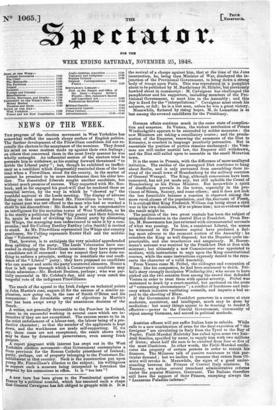German affairs continue much in the same state of complica-
tion and suspense. In Vienna, the violent retribution of Prince Windischgratz appears to be succeeded by milder measures : the new Ministers are taking a conciliatory course ; and the procla- mation of the Emperor, renewing the summons of the Diet to Kremsier, is couched in language peculiarly persuasive. But in essentials the position of parties remains unchanged : the Vien- nese are still under martial law, the Emperor still withdrawn, and the Diet still called upon to assemble in the small Moravian town.
It is the same in Prussia, with the difference of more unallayed irritation. The residue of the prorogued Diet continues to hang about Berlin, and is only prevented from assembling there in- stead of the small town of Brandenburg by the military coercion of General Wrangel. The King, although concessions have been rumoured, has not yet made any, but still upholds the Count of Brandenburg as his Prime Minister. But meanwhile a spirit of disaffection prevails in the towns, especially in the pro- vinces of Silesia, Saxony, and some others ; and it does not look the less formidable because a reaction is observed among the more rural classes of the population, and tlr,Gerinans of Posen. It is evident that King Frederick William cap bring about a civil war in his own dominions, if it so please him ; not so evident what the result might be. The position of the two great capitals has been the subject of animated discussion in the central Diet at Frankfort. From Ber- lin, M. Bassermann has just returned with circumstantial accounts of what was passing. In him, a consistent Liberal, the scenes he witnessed in the Prussian capital have produced a feel- ing most adverse to the recusant section of the Assembly : he considers the King as well disposed; but the Deputies quite im- practicable, and also treacherous and sanguinary. M. Basses- mann's account was received by the Frankfort Diet at first with mistrust ; but ultimately a new Commissioner was appointed to mediate, with instructions to urge upon the King constitutional courses, while the same instructions expressly denied to the recu- sants the character of a valid Assembly.
From Vienna came M. FrObel, the colleague and companion of Blum : like his companion, he had been sentenced to death. Pro- bers story strongly inculpates Windischgaiitz ; who seems to have picked out the two senators from among the crowd that defended Vienna in order to treat them with special severity. Friibel was sentenced to death by a court-martial, but pardoned on the score of "extenuating circumstances "; a conflict of harshness and leni- ency which indicates vacillating councils, and imparts a bad as- pect to the shooting of Blum. If the Government at Frankfort persevere in a course at once moderate, consistent, and intelligent, much may be done by mediation : but many things appear to be wanting to render it effective— power in the Central Government, community of object among Germans, and accord in political methods.


























